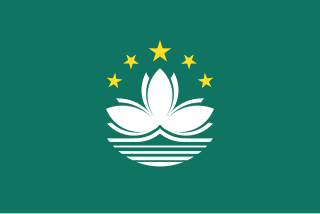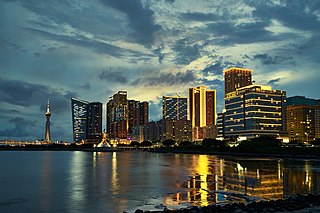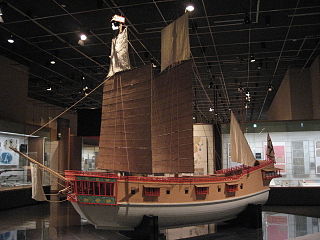Contents
| |||||
| Decades: | |||||
|---|---|---|---|---|---|
| See also: | Other events of 2020 History of Macau | ||||
| |||||
| Decades: | |||||
|---|---|---|---|---|---|
| See also: | Other events of 2020 History of Macau | ||||

Macau or Macao is a special administrative region of the People's Republic of China. With a population of about 710,000 people and a land area of 32.9 km2 (12.7 sq mi), it is the most densely populated region in the world.

The economy of Macau is a highly developed market economy. Macau's economy has remained one of the most open in the world since its handover to China in 1999. Apparel exports and gambling-related tourism are mainstays of the economy. Since Macau has little arable land and few natural resources, it depends on mainland China for most of its food, fresh water, and energy imports. Japan and Hong Kong are the main suppliers of raw materials and capital goods. Although Macau was hit hard by the 1997–98 Asian financial crisis and the early 2000s recession, its economy grew approximately 13.1% annually on average between 2001 and 2006. Macau is a full Member of the World Trade Organization. Public security has greatly improved after handover to the People's Republic of China. With the tax revenue from the profitable gambling industry, the Macau government is able to introduce the social welfare program of 15 years of free education to all Macau citizens. In 2015, Macau's economy saw a sharp decrease due to the reduced spending by visitors from Mainland China since the Anti-corruption campaign under Xi Jinping.

Huaqiao University (HQU) is a public university in Xiamen and Quanzhou, Fujian, China. It is affiliated with the United Front Work Department.

Red seal ships were Japanese armed merchant sailing ships bound for Southeast Asian ports with red-sealed letters patent issued by the early Tokugawa shogunate in the first half of the 17th century. Between 1600 and 1635, more than 350 Japanese ships went overseas under this permit system.
Air Macau is the flag carrier of Macau. It operates services to 24 destinations in Mainland China, Indonesia, Japan, Singapore, South Korea, Taiwan, Thailand and Vietnam, from the airline's home base at Macau International Airport. In 2014, Air Macau carried 2.12 million passengers with an average load factor of 68.20% and carried 15,900 tonnes of cargo and mail.

The Macau Grand Prix is an annual motorsport road racing event for automobiles and motorcycles held on the Guia Circuit in Macau. The event includes the Formula 3 Macau Grand Prix and Macau Motorcycle Grand Prix title races, with other races for touring, grand touring, sports and Formula 4 cars.
The time in China follows a single standard time offset of UTC+08:00, where Beijing is located, even though the country spans five geographical time zones.

Under the Basic Law, Macau's diplomatic relations and defence are the responsibility of the central government of China. Except diplomatic relations and defence, nonetheless, Macau has retained considerable autonomy in all aspects, including economic and commercial relations, customs control.

Religion in Macau is represented predominantly by Buddhism and Chinese folk religions. During the period in which the city was under Portuguese rule (1557–1999) the Catholic Church became one of the dominant faiths, but nowadays it has greatly declined.

Severe Tropical Storm Kammuri, known in the Philippines as Tropical Storm Julian, was a weak but deadly tropical storm which impacted the Philippines, China, Vietnam, and Hong Kong in August 2008. The ninth named storm of the 2008 Pacific typhoon season, Kammuri developed as a tropical depression on August 4 north of Luzon. The next day, the depression intensified into a tropical storm, resulting in the Japan Meteorological Agency naming it Kammuri. The following day, Kammuri reached its peak intensity with sustained winds of 50 kn (93 km/h) before making landfall in Guangdong province, China. This would make Kammuri weaken into a tropical storm that evening, resulting in the JTWC issuing their last advisory on the system. Kammuri would later emerge in the Gulf of Tonkin the next day, making a second landfall over Guangxi province, China. After Kammuri made landfall, the JMA issued its final advisory on Kammuri.
This article details the fixtures and results of the Chinese Taipei national football team.
This article details the fixtures and results of the Guam national football team.

China–Spain relations have existed since the 16th century. Relations between Spain and the People's Republic of China were established in 1973.

Gambling in China is illegal under Chinese law and has been officially outlawed since the Communist Party took power in 1949. Any form of gambling by Chinese citizens, including online-gambling, gambling overseas, opening casinos overseas to attract citizens of China as primary customers, is considered illegal. In practice however, Chinese citizens participate in state-run lotteries, regularly travel to legal gambling centers overseas or in the special administrative regions of Hong Kong and Macau and access gaming through offshore based proxy betting and online gambling companies.

Typhoon Ruby, known in the Philippines as Typhoon Yoning, was a strong tropical cyclone that struck Hong Kong, Macau, and southern China in early September 1964. The precursor disturbance to Ruby was first identified on August 29 over the Philippine Sea, and this system organised into a tropical cyclone by September 1. Ruby intensified as it moved west, becoming a typhoon the next day and subsequently passing over the Babuyan Islands of the Philippines. After reaching the South China Sea, Ruby turned northwest and intensified further, attaining peak ten-minute sustained winds of 195 km/h (121 mph) before making landfall at the peak intensity near Hong Kong on September 5. The typhoon weakened after moving inland and dissipated on September 6 over southeastern China.

The East Asia Super League (EASL) is an international basketball league featuring clubs from Japan, South Korea, Philippines and Taiwan.
The COVID-19 pandemic in Macau was a part of the ongoing worldwide pandemic of coronavirus disease 2019 caused by severe acute respiratory syndrome coronavirus 2. The first known case of the disease in the special administrative region of China was confirmed on 22 January 2020. The city saw nine more cases by 4 February, but no more cases until 15 March, when imported cases began to appear. Stringent government measures have included the 15-day closure of all 81 casinos in the territory in February 2020; in addition, effective 25 March, the territory disallowed connecting flights at its airport as well as entry by all non-residents, and from 6 April, the Hong Kong–Zhuhai–Macau Bridge was closed to public transport and most other traffic.
The COVID-19 pandemic in Southeast Asia is part of the ongoing worldwide pandemic of coronavirus disease 2019 caused by severe acute respiratory syndrome coronavirus 2. It was confirmed to have spread to Southeast Asia on 13 January 2020, when a 61-year-old woman from Wuhan tested positive in Thailand, making it the first country other than China to report a case. The first death occurred on 2 February, involving a 44-year-old Chinese man in the Philippines, also the first outside China. By 24 March, all states in the region had announced at least one case.

Severe Tropical Storm Higos, known in the Philippines as Tropical Depression Helen, was a tropical storm that affected China and Vietnam around the same area as Nuri two months prior. Higos formed from a tropical disturbance north of Luzon, the Philippines, on August 16. The storm tracked northeast and quickly intensified, becoming a tropical storm on August 17. The storm made landfall in Zhuhai, Guangdong at peak intensity on August 19, and quickly weakened soon after. Higos killed 7 people and caused 45 billion đồng in damages in Vietnam. Higos also caused more than US$140 million in damages, but no fatalities in China.